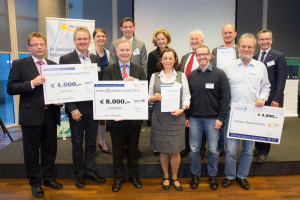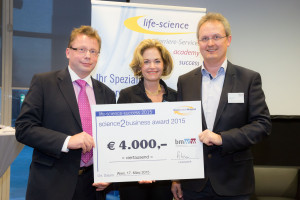Demographic changes bring new challenges in medical care as the proportion of the population in need has dramatically increased. Austrian universities and enterprises have always been open to new technologies that serve this need, reaching across borders for collaborators. The most innovative projects from this domain were awarded during the Science2Business award ceremony in Vienna, March 17th, 2015. Awards at a total value of 16,000 Euros for innovative and successful collaborations between industry and academy.

Science2Businesses Award winners (photo: www.lifescience.eu)
Hand-in-Scan won the 2nd prize with 4,000 Euro cash prize with the innovative hand hygiene control device. Inspired by the heritage of Ignaz Semmelweis, ACMIT (Austrian Center for Medical Innovation and Technology) in cooperation with the Budapest University of Technology and Economics (BME) and its spin-off, the Hand-in-Scan Ltd. developed, validated and starts to commercialize a novel hand hygiene control system (named Hand-in-Scan) for the direct and objective evaluation of hand rubbing.
 Hand-in-Scan aims to bring a complex integrated solution to the underperforming systems by introducing the first and so far only objective quantifiable quality control system on this field. The system has the unique capability to provide personalized, real-time feedback to the user and reports to the management on the efficacy of hand rubbing. The system uses UV light and digital imaging along with artificial intelligence-based software to highlight and then report disinfected versus infected areas after regular hand rubbing. With this innovation, it is possible to crack down on infections, and make it measurable.
Hand-in-Scan aims to bring a complex integrated solution to the underperforming systems by introducing the first and so far only objective quantifiable quality control system on this field. The system has the unique capability to provide personalized, real-time feedback to the user and reports to the management on the efficacy of hand rubbing. The system uses UV light and digital imaging along with artificial intelligence-based software to highlight and then report disinfected versus infected areas after regular hand rubbing. With this innovation, it is possible to crack down on infections, and make it measurable.
The scientific partnership between ACMIT and BME started in 2011, when the Hand-in-Scan project was in great need of a skillful partner to transit its crude concept and prototype towards a business case. By the time project received funding and got incorporated in 2012, ACMIT has become a key R&D partner. ACMIT is a K1-competence center in the framework of the “COMET” program of FFG, and could leverage the support from BME and the Hand-in-Scan project company to raise funds for efficient technology transfer. BME provides the physical incubator for the Hand-in-Scan laboratory and know-how for the engineering prototyping clinical validation, and the chemical development. ACMIT and BME has maintained a successful relationship for over 3 years, and this resulted in tangible outcome, e.g., the Hand-in-Scan has become an integral part of the medical doctoral training program since 2012 at Semmelweis University. The first clinical prototype was rolled out in 2013, and has been validate at National University Hospital in Singapore, involving more than 5000 healthcare workers. This clinical trial resulted in the world’s largest hand hygiene database available today. Clinical trials were performed in several Hungarian hospitals, and Hand-in-Scan received CE mark in April 2014. Meanwhile, a novel version of the device is also under commercialization based on the scientific findings and vast user experience with the initial version. Both ACMIT and BME remains deeply involved in the next stages of the project.

From left: Csaba Hanko (HandInScan Ltd.), Dr. Ulrike Unterer (BMWFW – Bundesministerium für Wissenschaft, Forschung und Wirtschaft), Nikolaus Dellantoni (ACMIT – Austrian Center for Medical Innovation and Technology)
(photo: www.lifescience.eu)
For more information visit www.handinscan.com or contact us at info@handinscan.hu.